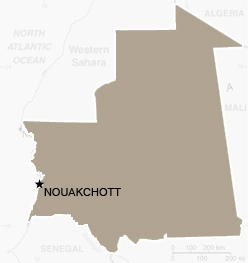Mauritania
Acceso al agua potable 60%
Alfabetización de adultos 51.2%
Mortalidad de menores de 5 años 63.42 per 1,000 live births
Evaluación del F-ODM, caso de estudio
 Esta evaluación es un ejercicio para generar conocimiento que busca: 1) evaluar la contribución del F-ODM, a nivel nacional, para alcanzar los ODMs, los principios de la Declaración de París y la iniciativa de reforma de la ONU conocida como "Unidos en la Acción"; 2) identificar buenas prácticas y las lecciones aprendidas para futuros programas conjuntos sobre desarrollo; y 3) conectar a las intervenciones de los programas a nivel local con los procesos de participación política a nivel nacional resaltando iniciativas piloto exitosas con potencial de replicación a mayor escala.
Esta evaluación es un ejercicio para generar conocimiento que busca: 1) evaluar la contribución del F-ODM, a nivel nacional, para alcanzar los ODMs, los principios de la Declaración de París y la iniciativa de reforma de la ONU conocida como "Unidos en la Acción"; 2) identificar buenas prácticas y las lecciones aprendidas para futuros programas conjuntos sobre desarrollo; y 3) conectar a las intervenciones de los programas a nivel local con los procesos de participación política a nivel nacional resaltando iniciativas piloto exitosas con potencial de replicación a mayor escala.
Mauritania_Country Final evaluation.pdf (1.97 MB) -
Ficha informativa para el país
-
NUESTROS PROGRAMAS CONJUNTOS
Scaling up the fight against child hunger and malnutrition in southeast Mauritania
This Joint Programme was established to combat an alarming increase in malnutrition in two southeastern regions of Mauritania, where the underweight prevalence in children under 5 rose from 35% in 2007 to 40% in 2008, more than twice the national average. The programme comprised a package of integrated interventions for the prevention and treatment of malnutrition, targeting more than 420,000 women and children with actions to improve food security, change feeding behaviors and strengthen the management of malnutrition.
Mainstreaming Local Environmental Management in the Planning Process
Southwestern Mauritania faces considerable environmental problems, with deteriorating natural resources and populations living in conditions of poverty, precarious health and a lack of basic services. In rural areas, only 20% of households have access to sanitation and nearly two thirds of people live below the poverty line, further exacerbating resource degradation. The aim of this Joint Programme was to promote sustainable management of natural resources and access to water and sanitation, and to ensure that environmental issues are taken into account in national planning processes.
Strengthening conflict prevention capacities and the rule of law in Mauritania
An explosion of ethnic tensions in 1989 precipitated a mass expulsion of tens of thousands of Mauritanians and produced a climate of tension, uncertainty and animosity. Declining living conditions, rising unemployment and poverty, and the uneven distribution of resources exacerbated traditional sources of conflict -- access to land and water -- and social prejudices and discrimination became rampant. The Joint Programme's goal was to reduce conflict and inter-community tensions by promoting national unity and the rule of law, improving the equal distribution of resources and creating conflict resolution mechanisms.
Heritage, tradition and creativity for sustainable development in Mauritania
Part of Mauritania's strategic fight against its high poverty rates is to develop tourism and related areas. The Joint Programme supported this goal by encouraging the growth of Mauritania's cultural sector as a way to drive development and generate incomes, with particular emphasis on women's activities. The programme focused on strengthening the national capacity to develop and promote cultural businesses, as well as the management, conservation and enhancement of the country's cultural heritage.




 Esta evaluación es un ejercicio para generar conocimiento que busca: 1) evaluar la contribución del F-ODM, a nivel nacional, para alcanzar los ODMs, los principios de la Declaración de París y la iniciativa de reforma de la ONU conocida como "Unidos en la Acción"; 2) identificar buenas prácticas y las lecciones aprendidas para futuros programas conjuntos sobre desarrollo; y 3) conectar a las intervenciones de los programas a nivel local con los procesos de participación política a nivel nacional resaltando iniciativas piloto exitosas con potencial de replicación a mayor escala.
Esta evaluación es un ejercicio para generar conocimiento que busca: 1) evaluar la contribución del F-ODM, a nivel nacional, para alcanzar los ODMs, los principios de la Declaración de París y la iniciativa de reforma de la ONU conocida como "Unidos en la Acción"; 2) identificar buenas prácticas y las lecciones aprendidas para futuros programas conjuntos sobre desarrollo; y 3) conectar a las intervenciones de los programas a nivel local con los procesos de participación política a nivel nacional resaltando iniciativas piloto exitosas con potencial de replicación a mayor escala. This Fact Sheet summarizes the key achievements of the Joint Programmes in Mauritania.
This Fact Sheet summarizes the key achievements of the Joint Programmes in Mauritania.